Paul Robeson
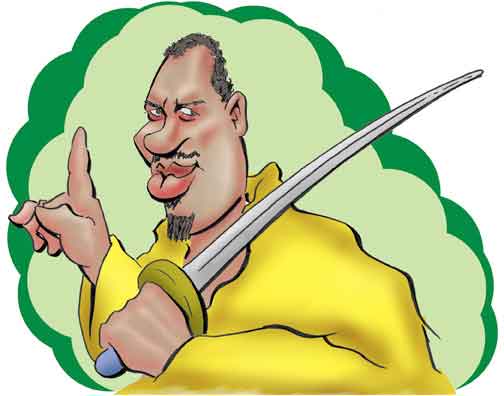
Paul Robeson
Instead of waiting on tables in hotels to earn money, I was being paid £20 or so a week for expenses to walk on a stage, say a few lines, sing a song or two. Just too good for words.
- Paul Robeson (Interview)
Paul Robeson had one of those careers which seems almost impossible. By the mid-20th century and as an actor, singer, and Civil Rights activist, he had become one of the most famous people in the world. He was known and loved by audiences in all continents and all countries.
Then when the 1960's rolled in, older people were wondering what happened to him. Their kids never knew he existed.
However, when Paul died in 1976 the television networks - all three of them - carried the story. The elderly remembered Paul, and their children learned who he was. Then with the rise of the compact disc, Paul's records reappeared in the bins and now the digital era has insured the universal availability of Paul's songs even after record stores themselves have long bit the dust.
Paul was born April 9, 1898 in Princeton, New Jersey. His father, William, was a minister who had been born a slave. Paul had three brothers and one sister, and Paul was the youngest.
Paul's mother died in a house fire when Paul was only 6, and for some years Paul's dad struggled financially. On the other hand, Paul was an excellent student and graduated from Sommerville (New Jersey) High School with top marks. He won a scholarship to Rutgers University where he was the only African American student. There he played basketball and football and really excelled at the latter. He also participated in the debating team and maintained academic excellence.
At Rutgers Paul also gained a reputation for his singing - with a deep rich voice which no one can decide if it was bass with a high range or baritone with low notes. But it really didn't matter as in any singing crowd Paul always stood out.
Naturally he became a member of the Rutgers Glee Club. But although this was the North, prejudice was still rampant. He was not allowed to appear in off-campus concerts, and for on-campus performances, he was "asked" not to attend the receptions held afterwards.
It was some consolation, though, that at Rutgers Paul was able to turn his singing ability to a profit. This was, after all, the time when if anyone wanted to listen to good music it had to be live music, and to enjoy themselves people actually left their homes. So Paul managed to arrange concerts and recitals where the attendees paid a modest fee. These events could be conveniently scheduled in local churches where there was little activity on weekdays. So by the time he graduated Phi Beta Kappa and as the 1919 class valedictorian, Paul had developed a regional reputation as an outstanding singer.
Although he did play professional football briefly, Paul decided that sports was not his true avocation. And as much as he enjoyed singing he hadn't busted himself getting an outstanding academic record for nothing. So after first enrolling at New York University, Paul transferred to Columbia Law School in Manhattan.
Columbia University, for those who don't know it, is at 116th Street. And when Paul arrived in the Big Apple it was at the height of the Harlem Renaissance. Well-known from the start as the whiz kid athlete/scholar/artist, he not only studied law but also continued giving recitals.
The best introduction to Paul's singing is the The Essential Paul Robeson. The first part - the first disc on the original vinyl version - was from the 1958 concert at Carnegie Hall. Although Paul was 60, his voice was still strong, and the piano playing of Alan Booth was much like that of Paul's longtime accompanist, Larry Brown.
Paul graduated with an LL. B. in 1923 and joined a major New York law firm. But when a secretary refused to take dictation because he was black, he realized it would be impossible for him to rise to the top of his profession.
Fortunately, Paul had a second career already going. With the carrying power of his deep booming voice and being in New York, it was almost inevitable that Paul would try his hand at live theater. According to one account, Paul had gotten a part in a play performed at the local YMCA, and he was soon trying out for roles at professional theaters. In the early 1920's, Paul was appearing regularly on stage and even was in a tour that went to England. Becoming a full time performer was now a serious option.
Paul's big break came in 1924 when he landed the lead in Eugene O'Neill's All God's Chillun Got Wings. It was a controversial play - not just about a mixed race marriage but about an unhappy mixed race marriage. Suddenly Paul was a star.
To see Paul Robeson the actor, there are plenty of his films now available. And with all due respect [he sneered] to the critics who evidently feel obliged to say Paul wasn't a very good actor, his performances actually seem pretty good. Certainly Paul's acting is as credible as that of the other - quote - "professionally trained actors" - unquote.
Instead when viewing old films it's easy to confuse acting ability with acting style. From the 1920's to the 1940's the motion picture actors tended to stick to "stage diction" either out of habit, custom, or because the sound equipment wasn't up to modern snuff. But once you get past the imperfections of the era, it's clear that Paul really does a decent job.
Probably the best introduction to the cinematic Paul is The Emperor Jones, again a film that is readily available. Scenes with Paul - that is Brutus Jones - dealing with the sleazy white trader Smithers (Dudley Digges) are great. At one point Brutus is trying to pick his throne name. "Mr. President" and "King Brutus" don't quite cut it. But just before he decides on "Emperor Jones", he calls for Smithers to light his cigarette - a reversal of roles that was scandalous for mid-1930's cinema.
And yes, in many of Paul's films the modern viewer has to negotiate his way through a mound of stereotypes. In fact, one consistent criticism Paul received even during his own lifetime was that for someone fighting for civil rights of minorities, he portrayed an awful lot of stereotypes. He appeared as a credulous sharecropper in Tales of Manhattan and as a subservient African chief in Sanders of the River. Regarding the latter movie - a shameless hagiography to colonialism - Paul said he had been misled about the plot and that the final editing had completely changed the message of the film.
Before passing a modern judgement on Paul's selection of roles, we have to consider the time the films were made. Sidney Poitier pointed out that it was hard enough for him, Sidney, to find meaningful roles in the 1950's and 1960's. So it was almost impossible for black actors of Paul's generation to play anything other than gross stereotypes. A film such as Proud Valley, where Paul played a miner working in Wales, was a rare exception.
Fortunately when playing live theater, Paul could get meatier roles. All God's Chillun Got Wings and The Emperor Jones (the play) established Paul as a leading stage actor, and with the 1930 London production of Othello, Paul was not just a stage actor, but a Shakespearean stage actor.
Paul's star reached the popular summit when he appeared in the musical Show Boat. Although he wasn't in the original cast, Paul starred in the London production in the late 1920's and in the American shows of the 1930's. And of course there was the hit movie in 1936.
No one can sing "Old Man River" without being influenced by Paul's version. The movie, though, has the "old" lyrics which now have to be bowdlerized if they are going to be sung. But it became Paul's signature song, and he soon modified the lyrics.
There's an old man called the Mississippi.
That's the old man I don't like to be.
What does he care if the world's got troubles?
What does he care if the land ain't free?
And there's the verse:
You and me, we sweat and strain,
Body all aching and wracked with pain.
Tote that barge! Lift that bale!
You show a little grit, and you land in jail.
And it ends up:
But I keep laughing, instead of crying.
I must keep fighting until I'm dying.
But Old Man River, he just keeps rolling along.
Paul was a resident of the UK for some years - he paid his taxes there - but he returned to the United States when the rumors of war began to rumble around Europe. After Pearl Harbor and at age 43, he was beyond the service age for GI's. Still, Paul joined in the war effort, singing in benefit concerts and giving speeches.
Then in 1942, the actor and director Margaret Webster offered Paul the title role in a new production of Othello. This was at the McCarter Theater in Princeton, and of course the intention was that the play would move to Broadway.
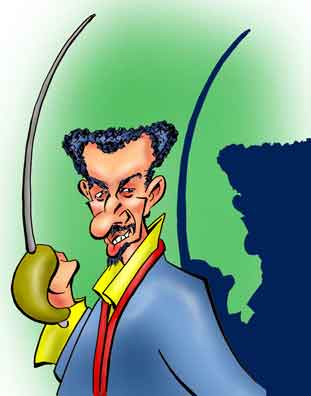
Jose Ferrer
Iago
Margaret had seen Paul's performance in London, but this would be the first time a black man played Othello in the United States. In addition to picking Paul, Margaret cast veteran actor José Ferrer as Iago and Joe's wife, Uta Hagen, as Desdemona.
What's not always remembered is that the reviews of Paul in the London production hadn't been that good. And now Margaret, Joe, and Uta had reservations about how Paul would fare, as during rehearsals he seemed stiff and his emotions unconvincing.
But they needn't have worried. After the first performance both the audience and critics roared their approval. In particular Paul's acting was lauded, and the show not only made it to New York but at nearly 300 performances still remains the longest running Shakespearean play on Broadway. Naturally after the run, they went on a multi-city extended tour.
At this point, we need to give tribute to the often unsung hero of Paul's life and career. That was his wife Eslanda (née Goode) whom he married in 1921. Essie also came from a well educated family and earned a Bachelor's Degree in Chemistry from Columbia University. She later undertook graduate work in anthropology, but most of the time she served as Paul's manager. Essie was also an excellent speaker and became a noted Civil Rights activist in her own right.
We have to be honest. Paul was not a typical family man and he had a number of, well, we'll call them distaff friendships that went beyond the bounds of Traditional Family Values. Although he remained married to Essie (she died in 1965), they spent more time apart than together. Among her voluminous correspondence were rather acerbic letters on subjects such as asking Paul if she was going to remain as Mrs. Robeson and chiding him for being seen with their son, Paul, Jr., only for photo-ops.
Essie and Paul, Jr., lived in their Enfield, Connecticut country home. It was a spacious house surrounded by tree festooned acreage and had its own bowling alley. Later Paul, Jr., attended school in Russia where he became fluent in the language. He then graduated from Cornell in Engineering and became a specialist - among his other activities - in translating Russian technical articles.
Paul, Sr., on the other hand, tended to make his abode in Manhattan, staying with various friends to whom he would pay rent. He would also stay with his brother, Ben, who was pastor of the famous AME Zion Church in Harlem. Although the two brothers differed in religious views and politics (Ben was a Republican and a friend of Nelson Rockefeller), they got along quite well. Ben was always happy for Paul to stay with him although Ben's family life could also be rather hectic.
At some point during the production of Othello, Paul and Uta became a pair. The relationship went on for a couple of years but eventually ended after an episode at the Ferrer home. Joe was - quote - "out of town" - unquote - and Paul and Uta had finished dinner. Uta, though, had an urinary infection, and so they were just sitting and talking in the living room. Paul relaxed in an armchair and Uta took her ease on the sofa. "We weren't", she later said, "doin' nuthin'."
Suddenly Uta felt a draft as if someone had opened a door from the outside. Sure enough, Joe stepped in - as did a lawyer and a private detective. Uta expressed - she hoped - pleasant surprise that Joe was there. But then Joe walked in and made a rather discourteous remark to Paul that Uta didn't quite catch. For his part Paul seemed saddened that his good friend would suspect him and Uta having anything other than a platonic and artistic relationship. Following an awkward silence, Joe and the two other men beat an embarrassed retreat.
Paul's next actions were, thought Uta, rather strange. He seemed on the verge of panic and immediately made telephone calls to some friends. Soon a big limo filled with men carrying guns showed up. They quickly whisked Paul away.
Speculation is that these gentlemen were, well, "employees" of Ellsworth "Bumpy" Johnson, who among other business interests, made protecting Paul one of his responsibilities. Uta later said that Paul had feared for his safety although she thought it was nonsense that Joe would do him harm. On the other hand, it was and remained common to entrap Civil Rights activists with frame-ups regarding women.
Actually Joe had known of Paul and Uta's get-togethers almost from the start. But with his own - ah - "side interests", he couldn't have cared less. But Uta thought that Joe decided that if he caught her and Paul in flagrante then he would be able to get out of paying any alimony.
Although news of a non-standard marriage with extra liaisons might have caused Paul negative publicity, these were the days when such a lifestyle could be kept under wraps. Instead what ultimately caused Paul his long term difficulties was his warm regard with the people, leaders, and life in the Soviet Union.
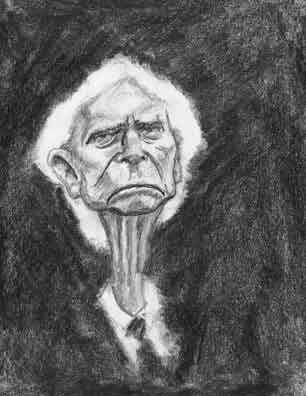
Bertrand Russell
He wasn't impressed.
When Paul appeared in Europe he made a side trip to Russia. The Bolshevik Revolution and the Russian Civil War were only a few years old, and the World had been watching Russia with a mixture of concern and interest. Celebrities other than Paul had also been making visits to see how "The Experiment" was turning out
Opinions were surprisingly mixed, and a lot of people who were inclined to give the Soviets the benefit of the doubt came away with distinctly negative opinions. Bertrand Russell, although himself a socialist, visited Russia and saw it as a terroristic dictatorship that destroyed individual liberty. Later he was to advocate pre-emptive nuclear strikes against Russia although later he said he didn't.
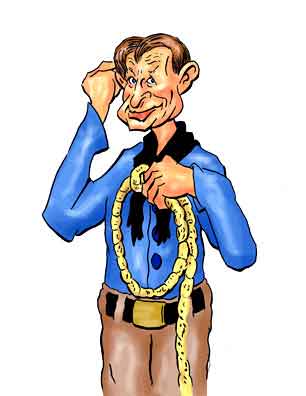
Will Rogers
Neither was he.
A bigger surprise was the response of humorist Will Rogers. As a man of the people who often spoke about how the big money boys were making it hard for the working man, you'd think Will would be onboard with the aims of the proletariat. But when Will visited the country in 1926, he saw nothing but the old Tsarist regime in disguise. Counter this, though, with Will's long time admiration for Benito Mussolini.
But when Paul showed up in Russia, the people loved him. He played to packed concert halls, and he met famous actors, musicians, writers, artists, and (of course) government officials. The 1920's were also the time that Russia and Germany had emerged as the world leaders of the newest and most innovative arts. Although that was soon to end in both countries, Paul loved what he saw and was sold on the Revolution.
But what really impressed Paul was the Soviet Constitution. It explicitly and unequivocally stated that all races were to be treated equally and that there was to be complete freedom of speech, thought, expression, and religion. With segregation still legal in the United States, Paul saw Russia as the hope of the future.
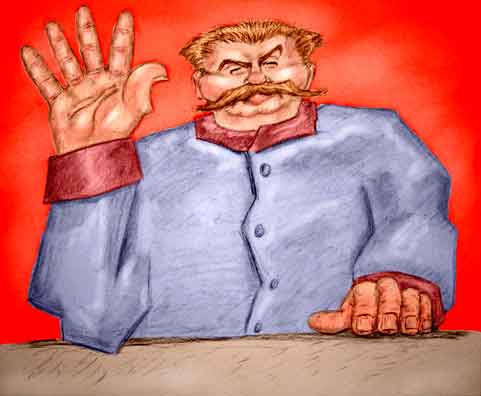
Josef Stalin
More Pronounceable
Lest we forget, a lot of people agreed with Paul's assessment. Certainly during the war, the Soviets were given (proper) credit for causing major defeats to the German armies, and at Leningrad and Stalingrad they possibly turned the tide of the war. In 1943 Life Magazine, then published and edited by Henry Luce (no bleeding heart liberal), even ran a special issue praising Russia and their leader, Iósif Vissariónovich Dzhugashvili, who is better known by the more pronounceable name of Stalin.
The issue - laughable now - was as good a piece of Soviet propaganda as you could wish. The articles were replete with happy smiling workers on the collective farms, commented that Lenin was arguably the most important man of the 20th century, and stated that people shouldn't worry too much about the lack of freedom in the country. Such minor imperfections would soon right themselves.
So after the war, people hoped the world would now settle down to a happy peaceful co-existence - a co-existence led by the British Empire upon which the Sun still never set, the United States with its newly acquired territories, and, yes, the Soviet Union, the defender of the people.
Fat chance.
On March 5, 1946, Winston Churchill stood on the speaker's platform at Westminster College in Fulton, Missouri and delivered his "Iron Curtain" speech. Suddenly the Soviet Union, once one of the Trusted Allies that defeated Hitler, was now the Big Baddie. Far from being a liberator of oppressed people, the Soviets were now just exporters of a new brand of terroristic imperialism and was setting up its own satellite-dictatorships as colonies around the world.
Paul, though, was not going to change his views just because an overweight, boozing, cigar-chomping ex-British Prime Minister who had founded a political career subjugating native peoples now flip-flopped on Russia. Paul stood by the Soviets and never wavered in his support.
Despite his disagreement with Winnie, Paul was still held in esteem in America and abroad. As late as 1947, he ranked high in the polls of the most admired American men. And he was still singing to packed halls.
Then came the election of 1948.
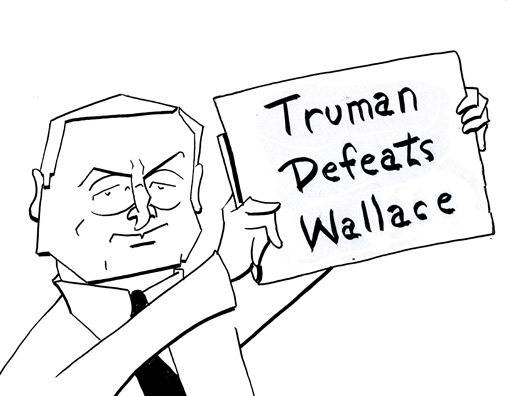
Harry Truman
He Defeated Henry
Yes, we know Truman defeated Dewey. But Harry also defeated a candidate that today almost no one remembers. That was Henry Wallace, the former Vice President from Franklin Roosevelt's third administration. Henry was the candidate for the Progressive Party and ran as an alternative to the Democrat and Republican tickets.
The problem was that Henry was considered left of the Left, and many Americans saw his campaign a poorly disguised front for the American Communist Party (known abbreviatingly as CPUSA). Stoking this perception was the conscious strategy of the Truman campaign. Clark Clifford, one of Harry's advisors, wrote a memo where he said they needed to make Henry look like a Commie. And Harry also needed to make sure that the Cold War tensions between Russia and America remained high.
Of course the negative campaigning against Henry had to be left to other Democrats. Harry could then take the high road and remain above the slung mud. Harry himself should concentrate on making big promises about Civil Rights.
And Harry indeed delivered a major Civil Rights address in Harlem and issued a desegregation order to the armed forces. Clark's strategy worked, and except for Paul and W. E. B. DuBois (who in old age did join the Communist Party) virtually all black leaders supported Harry and the Democrats.
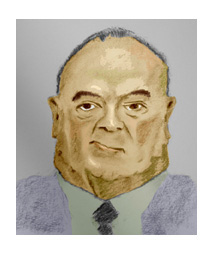
J. Edgar Hoover
He doubled down.
Although the members of Henry's campaign were optimistic and saw themselves as the leaders of the new, yet peaceful, revolution in American society, the truth is Henry's campaign crashed and burned from the first. Strom Thurmond, who ran on the racist, white supremacist "Dixiecrat" ticket, pulled in more votes. Strom even garnered some electoral votes, something Henry did not.
The growing split of the mainstream politicians - black or white - with Paul also coincided with the FBI doubling down on him. J. Edgar Hoover had specifically issued orders to gather material to prove Paul was a member of the Communist Party and also to find anything else that would target Paul for arrest.
There was just one thing. Try as they might, the FBI just couldn't find any evidence 1) that Paul was a member of the Communist Party or 2) that he was breaking any laws. The Feds continued to follow him around, bug his phone, and open his mail, but found nothing.
The reason, of course, was that Paul was not a member of the Communist Party, and he wasn't breaking any laws. And in earlier and friendlier days Paul had no problems discussing his political memberships. Once he had been asked by some congressmen if he was a CPUSA member. He had cheerfully replied no, he wasn't.
But on May 31, 1948, when Paul appeared before Congress to testify against the Mundt-Nixon Bill, it was clear he considered it an affront to be questioned on his affiliation. The Mundt-Nixon Bill was legislation that would require "Communist fronted" organizations to register with the government. In his testimony Paul refused to say if he was or was not a CP member. The question itself, he said, was a violation of his constitutional rights.
On the other hand, to refuse to answer a question before a Congressional investigation is a citable contempt. In this case, though, making a formal charge wasn't possible because there had not been a quorum of committee members present.
On the other hand Paul's answers did nothing to convince the congressmen that he was a loyal American. At one point, one of them asked if Paul would obey the Mundt-Nixon Bill if it became the law of the land. Paul answered he would not. That, he said, was like asking a Frenchmen during World War II if he had an obligation to obey the Nazi mandated laws of Vichy France. He, Paul, would opt to join the Resistance.
The fears generated by the Red Scare (as it was called) affected not only white middle class Amercans. Many minorities were also leery of Russia and the rapid rise of Marxism. The National Association for the Advancement of Colored People (NAACP) largely sided with the anti-Communists and even removed W. E. B. Dubois from his position in the organization.
But if there was one single incident that defined the rest of Paul's life, it was his famous speech in Europe on April 20, 1949. After his meetings with Congress, Paul traveled to Paris. There he spoke warningly against escalating tensions with Russia. Then regarding the now much anticipated beginning of World War III, Paul (allegedly) stated:
We denounce the policy of the United States government, which is similar to that of Hitler and Goebbels ... It is unthinkable that American Negroes would go to war on behalf of those who have oppressed us for generations against a country [the Soviet Union] which in one generation has raised our people to the full dignity of mankind.
We see two things here sure to raise hackles. First, likening someone to Hitler, as it is now, was considered something of a cheap shot - nothing more than a ad hominem argument. Certainly equating someone's beliefs with those of the Nazis is not the best way to get dialog started.
But it was the second statement - that black Americans would not fight a war against Russia - that was the hammer that broke the proletariat sickle.
In fairness to Paul, there are some issues with this quote. First, sentiments that black Americans should not fight wars defending a country that denied them full rights was nothing that other black leaders had not said before (or later - see the lyrics to "Abie Baby" from the Broadway musical Hair). And secondly, Paul almost certainly never said those exact words. According to Paul, Jr., the statement was actually released to the press before Paul gave his speech.
That said, the words do reflect the gist of what Paul believed. And if we take the words as quoted, he was not just talking about refusing to fight American wars until equal rights were achieved. Instead, Paul said specifically that black Americans would not fight against the Soviet Union. That's where Paul got some static.
An increasing number of Americans, then, began seeing Paul not only as a troublemaker, but as a traitor and a friend of America's greatest enemy. He was a man who had to be stopped.
And the best way to stop Paul was to stop his livelihood. An attempt by Paul to set up an outdoor concert in New York was blocked. Then when the concert was rescheduled on September 4, 1949 on a farm near Peekskill, Paul and the other performers and attendees left the event on roads surrounded by a rock throwing and epithet shouting mob.
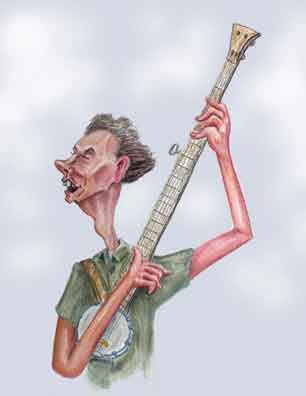
Pete Seeger
He also performed.
Even today around Peekskill discussions of the riot is a touchy subject, and how the highway patrol handled the matter is a matter of dispute. Some witnesses maintain the police tried to protect the performers and attendees. And yet when Pete Seeger, who had also sung at the concert, left in his car with his family, he said the police deliberately directed him down the road lined with the mob, and he was not allowed to proceed down an alternate route where he could have traveled unscathed.
Soon Paul found himself sequestered, not just from white America, but also from a number of black leaders and celebrities. Some recent writings and films and television programs hint that the black mainstream feared that aligning the Civil Rights Movement with Russia would set back whatever advances they had made. It was this fear of the American government that made them turn their backs on Paul.
Without saying this sentiment is entirely wrong, it's also true that there was much sincere disagreement with Paul's views. Even the Reverend Adam Clayton Powell - scarcely a subservient man - said that Paul Robeson by no means spoke for all black Americans. Then Roy Wilkins, head of the NAACP, even suggested Paul was out of touch with his own people because of his many trips abroad.
The opinion of the rank and file was also split. True, some letters to the editor from black readers spoke against Paul and his affiliation with the Communists and the Soviet Union. On the other hand, a number of editorials in the black press echoed Paul's sentiments. So a wedge was driven, not just between Paul and mainstream black leaders, but with the mainstream leaders and parts of the black population.
Although the wedge would eventually lead to the rise of the Black Power Movement, for now this was exactly what the Government wanted. Paul became isolated from much of the Civil Rights movement, and worse, he was being painted as a naive apologist for a murderous dictatorship that, far from granting equality to minorities, was repressing them as much as the Nazis had ever done.
Paul's position certainly wasn't helped by the Soviet leaders themselves. By the mid-20th century, there had been the government-produced Famine in the Ukraine, the Great Purges, the Show Trials, and the Rise of the Gulag. Ethnic minorities were specifically targeted in the famine and purges, and the number of Soviet citizens who ultimately died is generally accepted to be in the tens of millions.
As the 1940's moved toward to the decade's end, Stalin - old, ailing, and increasingly paranoid - started up yet one more purge. What made this purge different was that it was specifically directed at Russia's Jewish citizens and particularly the Jewish intelligentsia. Those in the West pointed to the suspicious death of the actor Solomon Mikhoels - supposedly killed in a hit and run accident in 1948 - and to the disappearance of the Yiddish poet Itzik Feffer. Both men had been good friends of Paul.
In 1949 Paul made yet another trip to Russia, partly as a fact finding mission. When he returned, he denied that there was any persecution of minorities. Why, he said, he even had actually met with Itzik who had come to freely to his hotel room.
The meeting of Paul and Itzik remains controversial, and to this day brings Paul considerable criticism. Itzik was in fact being held at the infamous Lubyanka Prison, and the meeting was a set-up by the MGB - the precursor of the KGB. The agents had taken Itzik to the hotel, let him meet with Paul, and then hustled him back to jail. Paul, his critics said, once more had been a naive lackey for a murderous regime.
Actually according to Paul, Jr., his dad knew full well what was going on and filled him in. But he had swore his son to secrecy so Paul, Jr., only revealed the truth after his dad had died.
The room was bugged, of course, but by sign language and writing notes, Itzik was able to inform Paul that their friend Solomon Mikhoels had been killed and that he, Itzik, was also certainly going to die.
Itzik was indeed executed in August of 1952. Sadly this was only two months before Stalin himself died and, many of the Jewish prisoners - including the wife of Vyacheslav Molotov (yes, the Vyacheslav Molotov of "Molotov Cocktail" fame) - were released.
With the advent of the 1950's, Paul found it was harder to get bookings as a speaker, singer, or actor. Then the State Department refused to issue Paul a passport. Making foreign tours was now impossible, and Paul's yearly income - once over $100,000 and big bucks at the time (and not too shabby now) - fell to $5000 or less. It is ironic that the country that kept asking Paul that if he liked Russia so much why didn't he move there, now wouldn't let him out.
The question remains why did Paul never criticize a government that history shows merited criticism - and a government that many of its own citizens criticized at great personal risk? Of course, from an epistemological standpoint, we'll never know the answer. But we can at least hazard a few guesses.
First of all, Paul did not equate communism, socialism, or Marxism with Josef Stalin. Criticizing a system of government and its economic basis for the actions of a former bank robber turned murderous dictator made no sense. Besides, attacking the Soviet government and its leaders would make life harder for the very people Paul was trying to help. So it was best for Paul to remain silent and even play along.
Although this may sound like good reasoning, and we must respectfully state that the opposite was likely to be the case. After all in the 1970's there was renewed Soviet repression of the arts. But the dissident artists and writers said the best thing was to have their names blazoned throughout the Western media. That way it would look a bit too obvious if they disappeared.
Finally - and this is probably the main reason for Paul's stance - to denounce Russia would be to join the ranks of the anti-communist crusade. Not only did Paul believe the Soviet Union was the hope for the future - which he stated for the record - but he also believed the anti-Communards were exactly the same group of politicians who were keeping full rights from America's black citizens and who were determined to maintain a segregated society. There was no way he was going to close ranks with them.
With the death of Stalin and the, well, "retirement" of Khrushchev, the dissident movement gained strength. One person who knew him well said Paul always aligned himself with the dissidents. Being a dissident did not mean you were opposed to socialism per se. But you wanted to hold the Soviet government to enforcing their constitution with its assurance of free speech and freedom of expression.
Unfortunately, by definition the dissidents were vocal in their criticism and a silent or secret dissident was a contradiction in terms. The truth is Paul never gave an iota of criticism against the official Soviet government, past or present, not even after Khrushchev denounced Stalin and his regime. Then when the Hungarians tried to gain their independence with the famous uprising in 1956, Paul likened the Hungarian resistance to those which fought against the Spanish Republic during the Spanish Civil War. Unspoken was that those who fought the Republican forces were the Fascistas Nacionalistas of Generalissimo Francisco Franco.
Perhaps its here that we see Paul's major error. From the early 1930's Paul saw Russia as the primary opponent of fascism, and - ignoring the German/Soviet Nonaggression Pact of 1939 - during World War II the Soviet forces were an important force in their defeat. As a result Paul tended to see any opponent of the Soviets - to use words of George Orwell - as "objectively pro-fascist". To support the Soviet government was to fight fascism. To oppose Russia was to support it.
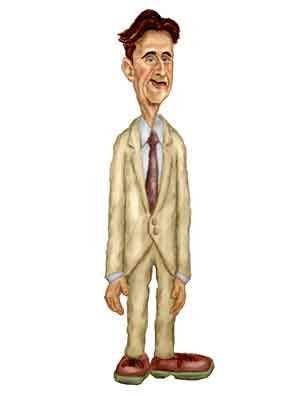
George Orwell
An Adamant Opponent Along with Bertie
Of course, many disagreed with this dichotomic approach. Bertrand Russell and George Orwell, both democratic socialists, were adamant opponents of both Soviet communism and fascism. In their opinion there was no contradiction in fighting both.
We wonder what Paul would have thought had he lived past the 1980's. He would have seen the final years of the Brezhnev era where the Soviets were led by a series of increasingly dottering and senile leaders. ("Commandant! Leonid Ilyichovich is standing in his room mumbling to himself and staring glassy-eyed out the window!" "Don't worry, comrade, he's just rehearsing his next speech.") And he would have lived to see a world where the son of Nikita Khrushchev became a naturalized American citizen. But it was a full fifteen years after Paul died before the Soviet Empire finally came a-tumbling down.
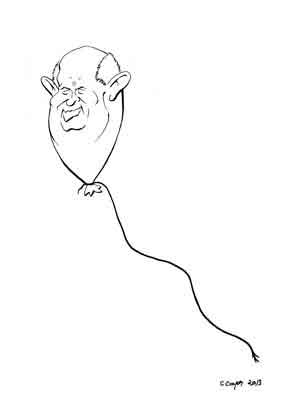
Nikita Khruschev
Father of a US Citizen
Scholars debate how a massive Empire dominating perhaps 30% of the world could completely collapse in a matter of months. Ironically it seems that the very success - yes, the success - of the Soviets spreading Marxism is what did it in. As more and more small remora-like countries jumped on the Communist bandwagon, they expected - and got - Soviet monies to establish and perpetuate their new Marxist regimes. And of course that establishment and perpetuating required rubles - lots of rubles - and rubles which left the Soviet Union never to return.
Which brings us full circle. What would Paul have thought if he had lived to see that now more than half of the former Soviet citizens are yearning for the Good Old Days of Communism? Some are even looking back fondly to the Years of Uncle Joe. Purges, mass murders, and the Gulag notwithstanding, times back then, they said, were better. Certainly the cash flow was better. When Uncle Joe died there were four US dollars to the ruble. Now a ruble is - literally - not worth 2 cents.
As the 1950's faded out, diplomatically dealing with Russia gained favor. Non-tailgunner Joe McCarthy was censured by the US Senate, and cultural exchanges between the US and the USSR increased. Even Nikita paid a visit to American soil, and he debated on television with Vice-President Richard Nixon about whether American or Russian kitchens were better.
Paul found major concert halls were once more willing to book him. He began to play to sold out crowds including the legendary performance at Carnegie Hall on May 9, 1958. Bowing to popular opinion - not to mention a 5-4 Supreme Court ruling - the State Department returned Paul's passport. He immediately left for Europe where he appeared in a new production of Othello in Stratford-Upon-Avon. And of course, he visited Russia.
On March 4, 1961, Paul had been at a party in Moscow. The people were happy to meet him, and things were festive all around. Then in the early morning hours, Paul was found in the bathroom with his wrists slashed. Fortunately, the bleeding was stopped, and Paul was taken to a hospital. There the Soviet doctors diagnosed Paul as suffering from major depression due to arteriosclerosis.
Despite this early diagnosis, the nature of Paul's illness remains a matter of debate. The official story is that, yes, Paul indeed suffered from arteriosclerosis and other age-related illnesses. His physical condition plus the stress of his long-time political problems had simply taken too heavy a toll on his mind. For the rest of his life Paul remained under psychiatric care.
Others though postulated (and still do) a more sinister cause of Paul's declining health. They say his problems were machinated by the US Government, who had surreptitiously slipped Paul psychotropic drugs.
Normally people roll their eyes at such "conspiracy theories". However, we must remember that Paul was listed as a dangerous subversive by the FBI, and this was indeed a time when the covert branches of the US Government were sending in agents provocateurs into dissident groups, hiring the Mafia to give Fidel Castro poison cigars, and slipping lysergic acid deithylamide (LSD) to unsuspecting US citizens. And there are those - including Paul, Jr. - who believed that Paul, Sr., was a victim of the latter "program".
That said, though, the general consensus remains that Paul died of natural causes. After being treated at various institutions (where the staff at the Buch Clinic in East Germany helped considerably), he lived with Paul, Jr., and his family in New York City. He later moved to the home of his widowed sister, Marian, in Philadelphia. Some people accused Paul, Jr. of "sequestering" his dad, but friends of the family said the decision to limit visitors was the Elder Paul's own wish. He was happy enough to see old friends from time to time, and when a visitor once asked him how he was doing he replied, "Just kicking along."
In 1973, there was a huge gala multi-star celebration at Carnegie Hall for Paul's 75th birthday. Paul was unable to attend but sent a recorded message. The voice, although a bit thinner and huskier than of old, was clearly the old Paul.
Though ill-health has compelled my retirement, you can be sure that in my heart I go on signing. But I keeps laughin' instead of cryin', I must keep fightin' until I'm dyin', and Old Man River, he just keeps rollin' along.
On December 28, 1975, Paul was in the hospital following what appeared to be a minor stroke. At first things seemed OK, but suddenly he became weaker. On January 23, when two long-time friends, Dr. Sam Rosen and his wife Helen, stopped by to visit, they were told Paul had died about an hour before. He was, after all, 77 years old, and at a fairly ripe old age for the time.
References
Paul Robeson, Martin B. Duberman, Knopf, 1988.
The Whole World in His Hands: A Pictorial Biography of Paul Robeson, Susan Robeson, Citadel Press, 1981
"Paul Robeson Speaks: Writings, Speeches Interviews, 1918-1974", Paul Robeson, Philip Foner (editor), Quartet Books, 1978.
Paul Robeson: Here I Stand, American Masters, Eagle Rock Entertainment, February 24, 1999, Internet Movie Data Base.
"1936 Constitution of the USSR", Department of Russian Studies, Bucknell University
"Robeson's Message From the Grave", Andrew Stewart, The Independent, December 22, 1997.
"What Paul Robeson Said," Gilbert King, Smithsonian, September, 2011.
How Can I Keep from Singing: Pete Seeger, David Dunaway, McGraw Hill, 1982.
Letters Of A Self Made Diplomat to His President, Will Rogers, Albert and Charles Boni, Inc., 1926.
Will Rogers: A Biography, Ben Yagoda, Knopf, 1993.
The Black Past, blackpast.org.
Prisoner's Dilemma, William Poundstone, Doubleday, 1992
"Paul Robeson: A Hero Who Betrayed His Friends", Eric Fettmann, New York Post, May 30, 1999.
"Alan Booth, 71, The Pianist for Robeson", The New York Times, June 16, 1996.
"Paul Robeson's Tragic Love of Russia", Maxim Matusevich, Past in Present, Seton Hall University, November 8, 2015.
Life Magazine, Available on Google Books
Special USSR Issue, Life Magazine, March 29, 1943.
"Negro Captain", Letters to the Editor, Life Magazine, p. 4, December 27, 1948.
"I Walk in Dignity", John Diggins, The New York Times, February 12, 1989.
The Emperor Jones, Paul Robeson (actor), Eugene O'Neill (playwright), Dubose Heyward (screenplay), Dudly Murphy (director), Internet Archive, https://archive.org/details/TheEmperorJonesVideoAudioUpgrade, 1933.
"Paul Robeson Centennial Celebration - Resources About Paul Robeson (1898-1976): Sports", Computer Professionals for Social Responsibility.
"Why Do So Many People Miss the Soviet Union?", Adam Taylor, The Washington Post, December 21, 2016.